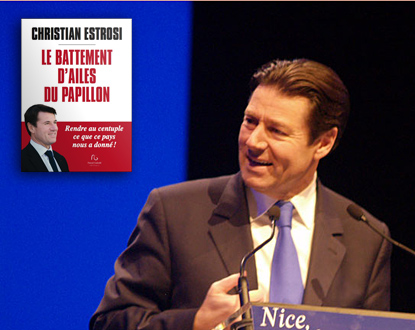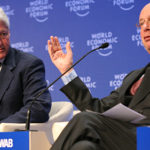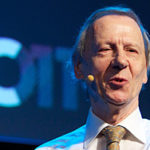Last Saturday, Christian Estrosi signed copies of his literary work at the Maison de la Presse.
Garibaldino took the opportunity to read this book and share his commentary with us.
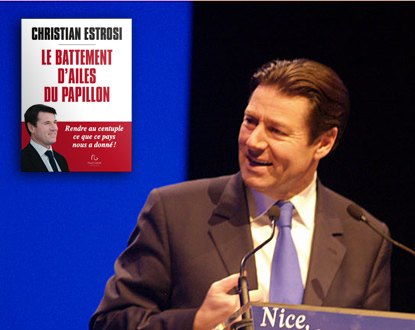 There is a virus that political scientists and media experts have not yet succeeded in diagnosing, much less defining: it is the (psychological? physiological?) need for politicians to write (or have written for them) or simply sign a book. Is it a need to leave a trace of their presence, often long in terms of time but rarely significant in terms of legacy, in political life? Unfortunately, Christian Estrosi (where did he find the time?) hasn’t been able to escape this virus, and he too has “produced” his opus titled: “The Butterfly Effect” (see box).
There is a virus that political scientists and media experts have not yet succeeded in diagnosing, much less defining: it is the (psychological? physiological?) need for politicians to write (or have written for them) or simply sign a book. Is it a need to leave a trace of their presence, often long in terms of time but rarely significant in terms of legacy, in political life? Unfortunately, Christian Estrosi (where did he find the time?) hasn’t been able to escape this virus, and he too has “produced” his opus titled: “The Butterfly Effect” (see box).
What a pity! For what was certainly intended to be an intellectual biography and testimony of his time ended up being a sort of comic strip with a constant tug between “I” and “me,” a cookbook offering as a starter an ode to personal virtue; as the main course, the virtuous ordeal; and as dessert, somewhat predictable reflections.
In fact, it’s not really surprising because, as we know, Christian Estrosi, while undoubtedly brilliant, sometimes falls victim to his virtuosity!
And yet… and yet, Christian Estrosi would have had much to say
First of all, he could have told today’s youth, often fragile and bewildered, who seek the path forward through life’s fog of difficulties, who doubt the possibility of social ascent, what determination and commitment can do for personal success.
And explain to them how he, a young man of modest social status, without a high academic background but “through work, determination, discipline, and rigor” can become an international-level sports champion, a leading politician, councilor, then mayor of his city, president of the general council of his department, regional councilor, parliamentary deputy of his constituency, minister of his country, and future “leader” of Nice Metropolis, the first metropole in France.
All this with the sole weapon of a desire to act, strong capacity to learn quickly and well from the school of life, showing reactivity and tenacity to tackle difficulties and challenges.
Who could say better? What a remarkable journey! What a fine example to follow and what a positive model to pass on!
He could have disseminated, as an example, “self-worth,” as Aristotle taught us in his work “Nicomachean Ethics” instead of delivering a confusing 10-chapter discourse, useful for fueling discussions between supporters and detractors at the local café… if any are left!
In fact, we agree, you should keep it simple. Unfortunately, the simplicity of this book compared to the complexity of the arguments addressed is rather lacking!
But since this book was written and published, we find ourselves in the “freedom of analysis” (as Socrates would say) to comment on some strong points:
The guiding thread of the work is social Gaullism, that of the late Jacques Chaban-Delmas and Philippe Seguin, Gaullists defending social democracy, without challenging capitalism (social-democratic reformism), of which Christian Estrosi claims to be a worthy successor.
This leads us directly to the theories of the British sociologist Anthony Giddens, initiated in his work “Beyond Left and Right” in 1994, and even better defined in “The Third Way: The Renewal of Social Democracy” in 1998.
Anthony Giddens aimed both to redefine social theory and to reexamine our understanding of the development and trajectory of modernity. It was Giddens who conceived the political approach of the “third way” that guided the actions of Tony Blair in Great Britain as well as Bill Clinton in the United States.

Has Christian Estrosi become a supporter of this “third party,” at least ideologically, while being an activist and leader of a right-wing political party (UMP)? Defining the UMP as “the closest and sometimes least distant (political) family” seems to us a clever dodge but an insufficient answer.
Christian Estrosi writes “I do not believe in unbridled liberalism,” and advocates that “the values of justice and equity should become the driving force of any project.”
This statement can only be surprising when considering that Christian Estrosi was a Minister in a government whose policy was a copy-paste version of “turbo-capitalism,” the outcomes of which in terms of wins and losses are well-known today.
Has he now become an advocate of the theories of Klaus Schwab, the founder of the Davos Forum*?
For Klaus Schwab, “capitalism needs to be reformed for three reasons:
1 – Capitalism has become unbalanced. The speculative implementation of virtual capital compared to the use of capital in the real economy has shattered the bounds of reason and has gotten out of control. To balance risks, we need financial operations rather than transactions speculating with speculation itself.
2 – In the original capitalist system, we made a clear distinction between, on the one hand, the shareholders and, on the other hand, the managers. Increasingly, managers have been tied to the interests of capital holders by an excessive bonus system, which has perverted the system. This is where the root of evil lies, as it leads to excessive rewards and undermines the professional ethics of the manager.
3 – Capital is no longer the decisive production factor in the globalized economic system. Competitive advantages will be generated based on intellectual, thus immaterial, performances.
Economic performance will primarily be determined by the production factor that is talent, which calls for an innovative training policy, continuous throughout the active life of each individual.”
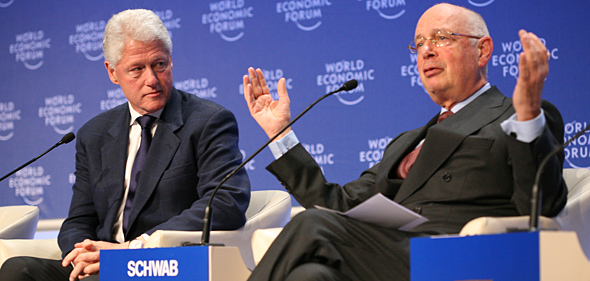
If this analysis is correct, it implies an active role for the state as a strategist, capable of supporting businesses without impeding their freedom, facilitating the blossoming of talent, creating a favorable environment for their development, and offering a global and coherent approach to optimize each stage of production.
Is Christian Estrosi committed to this path when he claims the “assertion of his share of freedom”?
Today, in France (Insee-2009), where Christian Estrosi plays his role and responsibilities in politics, 80% of the working population earns less than 2000 euros per month.
Does Christian Estrosi want to be the voice of this numerical majority, even if it is dispersed and (still) silent today?
Continuing: “the human dimension must imperatively be at the heart of every economic and financial decision…”
‘Nice Sound’ (what lovely words)! Who could be against it?
But for this, the way politics is conducted must change. We need to say “stop” to poll-driven politics, short-term decisions, and immediate returns in terms of electoral consensus. These imply a lack of leadership and the spread of “followship,” i.e., politics that follow public mood often manipulated by information and its technological distortions. Because if we want to have social responsibility as a compass, not only in civil society and the business world but also in politics, leaders must operate with a long-term vision aiming primarily for social cohesion.
And to conclude, “Europe exists, France is part of it” —what does this mean? First and foremost, a ‘we’ and ‘them’ cannot exist because Europe is ‘us’!
But which Europe is Christian Estrosi talking about?
The community-oriented Europe, driven by solidarity, built on institutions seeking the general interest and concerned with ensuring harmonious coexistence among states of all sizes? as Sylvie Goulard, a political adviser to Romano Prodi when he was President of the Commission, put it.
The mayor of Nice certainly has values, a vision, and an ability to act even if the reflection—this step between the idea and its application—sometimes fails him, and he relies too much on communication without considering that its overuse makes it inaudible with the consequence of no longer being its subject but its object.
This book is an example: vocation, conviction, or political positioning?
On the national level against young wolves such as Laurent Wauquiez and his social right-wing stance and locally in anticipation of a second round in the upcoming municipal elections against the FN candidate when he will need a vote transfer from the left.
Finally, to return to the title of the work and its message, let us suggest the words of Zygmunt Bauman, who is considered one of the most important living philosophers and sociologists:
“The allegory of the butterfly goes against the conviction, which is ours, that we can have knowledge of all that will come. It is the theory of the ‘whole’: we can with technology know, predict, create if necessary. But in this discovery by Lorenz lies a glimmer of hope: the flapping of wings signifies not to forget the value, however marginal, of small movements. Our imagination must go far beyond our capacity to do or not do things well. In human history, we have had a number of men and women who, like butterflies, have changed history radically and positively: so let’s help the butterflies flap their wings!”
This positive vision of Bauman’s future opens the path of hope and connects with this beautiful and significant expression of Christian Estrosi in the epilogue: “prosperity is inseparable from hope”.
Nonetheless, the road ahead for Christian Estrosi will be long and often lonely (“Rari nantes in gurgite vasto,” Virgil, Aeneid).
But, in terms of wishes, we remind him of what Tacitus (De oratore) wrote: “It is in the magnitude of the task that man’s worth is seen.”
